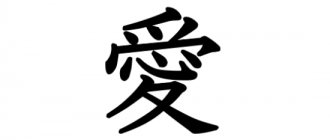The wisest sayings of Japanese sages
Japanese culture is amazing. You can talk about it for hours, but comprehend it endlessly.
The modern culture of the Land of the Rising Sun includes about fifty Japanese philosophers, whose works are included in the cultural heritage of the nation. It’s unlikely that any of us have heard their names, but this will not make their works and philosophy of life any less brilliant. Japanese sages were accustomed to expressing their thoughts wisely and briefly. For example, among many Japanese idioms, quotes and expressions, yojijukugo (a four-character idiomatic phrase) stands out as a special feature.
But the flight of Japanese thought is not always limited to four characters. Many Japanese writers, philosophers and poets, no less clearly expressed their thoughts through fiction and poetry. Today Notagram.ru recalls the brightest pearls of the cultural heritage of the land of the rising sun and the wisest and merciless expressions of the Japanese sages.
Text of the book “Japanism. The Little Book of Japanese Life Wisdom"
E. Niimi Longhurst Japaneseism The Little Book of Japanese Life Wisdom
Erin Niimi Longhurst
JAPONISME: The Art of Contentment
Translation from English by Evelina Melenevskaya
© Erin Niimi Longhurst, 2018
© Ryo Takemasa, illustrations, 2018
© Melenevskaya E. D., translation into Russian, 2021
© Edition in Russian. LLC Publishing Group "Azbuka-Atticus", 2021
CoLibri®
* * *
Introduction
I grew up surrounded by several cultures at once. My father is English, my mother is Japanese, I was born in London, lived in Seoul, in London, and then, for several years, in the “melting pot” called New York. But always and everywhere I felt my connection with Japan - my mother and, of course, our extensive Japanese relatives, to whom I came to while away the stuffy, humid days of summer, were a strong link to it.
In recent years, I've written a lot about Japan on my blog, mostly recipes, lifestyle posts, and travel tips. The places where I have lived are scattered all over the globe, but I have always felt that, no matter what aspects of my life it concerns, I return again and again to the rules, rituals, habits and traditions that I learned with my upbringing, over time family life and in general during the time that I spent in Japan.
The term “Japanism” came into use at the end of the 19th century - this is how they began to designate the interest in Japanese art and design that flared up in the West at that time. Over the past few years, this interest has grown significantly: the world has now become interested in Japanese culture in its entirety, from music and cinema to food and clothing.
In my opinion, the specialness and uniqueness of Japanese culture developed under the influence of long-term isolation. The Japanese have developed such a stable and distinct national identity because they were cut off from external influence for many years. For more than two centuries, Japan adhered to the “closed country” policy - sakoku
.
Under the Tokugawa Shogunate[1] 1
Feudal Military Government of Japan, 1603–1868.
– Approx.
translation [Close] Contacts between Japan and the rest of the world were strictly limited. Since the beginning of the 17th century, only a select few were allowed to cross borders in both directions. This policy was intended to protect Japan from the perceived threat of foreign religious and colonial influence.
Of course, two and a half centuries of national self-isolation are already far behind us (with the sakoku
ended in the early 1850s), but I firmly believe that it was this long period of solitude that played a huge role in shaping the fabric of Japanese society. Inside a closed, geographically distant “bubble,” a culture emerged and flourished that, in my opinion, is what made Japan so unlike any other country in the world. Undoubtedly, it may seem strange, and sometimes even baffling, but at the same time it continues to remain hypnotically beautiful, enlightens the soul and enriches the mind. Like a satellite in orbit, I have been returning to Japan invariably for the past 26 years and every time I learn something new, look around as if for the first time, see life differently - again and again.
So what can you learn from the Japanese (without getting on a plane)? How can one - like me - apply Japanese culture to everyday life outside of this small island country? For me, the main lesson I learned from my maternal grandfather was the understanding of what balance is. One of 13 children in a peasant family, my grandfather Haruyuki rose to become an influential businessman and eventually became CEO and Chairman of the Board in Japan.
My grandfather's career trajectory began with a chance friendship with two American soldiers serving in what was then an economically depressed Japan, humiliated by its defeat in World War II. Heeding their advice, my grandfather traveled to the United States of America on the Hikawa Maru, named after the famous Shinto shrine in Saitama (it took him two weeks to cross the Pacific Ocean). Earning his living as a gardener, waiter, and house servant, he earned a bachelor's degree in economics from the University of Washington. During his stay in the United States, he learned principles of work and business relationships that in his native Japan were perceived as very non-standard and frankly Western. However, throughout his life, my grandfather was proud of his national roots and, in particular, of Japanese culture, history and traditions.
It was from my grandfather that I learned what mindfulness is and how important it is to maintain it in yourself so that life is full of joy and satisfaction. We live in times when a person’s connection with the outside world is becoming ever closer, and we have to pay for it. Everyone has experienced how difficult it can be to break out of the constant flow of communication, disconnect from the information avalanche, how stressful and even dramatic the inability to separate personal and professional life turns out to be (push notifications are one of the great evils in this sense).
My jiji
[2]
2
Jiji (“grandfather”) is how Japanese children call their grandfather in a relaxed family setting.
– Approx.
translation [Close] showed me the importance of always making time for self-care. This is what helped him be happy, productive, and resilient. He spent his working week in the bustling, seething heart of Tokyo, where the day begins early and ends late. But on weekends, he and his grandmother always returned to Kamakura, a beautiful city on the seashore, where his grandfather “recharged his batteries.” There he spent hours tending to the orange trees he had planted in the garden, going on long walks in the surrounding hills, painting pictures, writing poetry, and meticulously cutting up and slicing raw fish for dinner. When times were tough in my work career, I would organize my thoughts and feelings in much the same way - doing something creative (photography or writing), cooking (for example, making Japanese gyoza
- a monotonous task, but it works effectively), put things in order in the wardrobe or papers. This helped me get into the right state of mind, one that was more grounded and productive.
As he grew older, my grandfather, increasingly turning to the spiritual side of life, became one of the nine community elders of the local Tsurugaoka Hachimangu Shrine, the cultural heart of Kamakura and the most important Shinto shrine in the city. My grandfather revered and loved this temple so much that he always came there when he needed clarity of thought and peace of mind. This place brought him back to his roots. Work in the temple meant a lot to my grandfather: he did not resort to moralizing maxims and did not read sermons just to hear the sound of his own voice, but filled all the rites and rituals in which he took part with understanding, sincerity and significance.
He got up early and in the mornings, before the car that took him to work arrived for him, he tended to his garden. And he loved to keep me company when, jet-lagged, I slipped out of the house at three in the morning to wear a
[3]
3
Small general store within walking distance.
– Approx.
ed. [Close] to satisfy the sudden, intense desire to eat red bean ice cream. Then, when we were slowly returning home, my grandfather said: “Look, what a beautiful sunrise!” or “Listen, how quiet it is on the streets...” - and thereby taught me to enjoy what I might have missed without him.
My grandfather died in my last year at Manchester University, and it was only when I began my own career that I fully realized how much he influenced me, how much of his thoughts I had absorbed over the years. By drawing my attention to the silent, fleeting moments, the smallest movements and the almost imperceptible nuances, he helped me to recognize and accept the features of my spiritual heritage that shape and guide my life.
When I meet a person and tell him about my Japanese heritage, the conversation immediately becomes animated, but after a while it inevitably slides into a discussion of how my interlocutor feels about, say, anime, or Japanese cuisine, or karaoke.
I have found that, as a somewhat anxious and wary person by nature, I quite often resort to various “Japanese” methods when I need to gain clarity, restructure and withstand the challenges of life. This is exactly what I want to share with you: not a story about abstract Japan and its abstract culture, but principles and strategies that help me get out of difficult situations, overcome the obstacles and slingshots of modern life. Taking on this task, thinking about it, talking to myself and transferring to paper the very essence of these principles and traditions, I seemed to appreciate them again and love them - and, perhaps, even more than before. I realized that I was leaning on them without even realizing it. I hope that they will give you comfort, happiness and food for the mind - those joys that are hidden in the love of quiet, deep, ordinary and bright moments on our long journey of life.
The first part of this book - “Kokoro” - tells about the soul and mind. About what motivates us to do what we do ( ikigai)
), and about what brings us joy, about the beauty of change (
wabi-sabi
) and the passage of time, about how to see the beauty in imperfection and pay tribute to the difficulties and trials that leave their mark on us (
kintsugi
). Part two, “Karada,” is dedicated to the body: how we interact with the world around us (about walks in the forest, making bouquets and organizing the house), how we take care of ourselves (about food, tea and bathing), how we stimulate our mind (about calligraphy). Finally, part three, “Syukanka,” is devoted to how all this can be ingrained in everyday life so that it becomes our habit - that is, second nature.
There is a lot in Japanese cultural life that can (and should, I think) be accepted everywhere. How to change your mood by finding a minute for a cup of tea or half an hour for a walk - these and other techniques are of absolute value for those who feel exhausted, driven, consumed by anxiety, always late and not getting anything done. Yes, too often we feel that we are bogged down, hunted and squeezed to the limit, to the last drop. We are constantly stressed in the pursuit of perfection: trying our best to be happy (and never sad, angry or upset), trying to always look amazing. We are told that we must manage to do everything: build a successful career and at the same time take care of our family properly, eat well and tasty and at the same time have a beautiful body... However, this approach to life is shaky and unreliable, because it does not take into account the chaos and confusion of reality. life: deadlines are pushed back every now and then, employees have difficult days and they take out their bad mood on us, we ourselves or our relatives suddenly fall ill. In a word, life is full of stress and tension, so at best, the demand for total compliance with the ideal is unattainable, and at worst, it is simply dangerous.
The philosophy I will share with you is part of Japanese culture. It helps you realize the transience of life and develop your attitude towards it, find beauty in chaos, and teaches you to appreciate and respect your scars. All of this is wonderfully liberating: yes, there are things that tend to end, and there are events that are like the wind blowing sharply in your face, but there is nothing negative about it. This philosophy teaches not how to achieve perfection that is inaccessible to us, but how to feel satisfaction and fullness of life in which you are immersed here and now, how to find the strength to tell yourself: yes, a person is imperfect, and so am I, but this is normal.
This book is full of practical advice, tips, suggestions, recipes and other things that will help make your life more fulfilling. The unique, beautiful, magical Japanese islands breathed the soul into all this. Just think: spices, which in former times had to be transported by sea (and at great expense!), can now be bought in any supermarket; a bento
– boxes of intricately decorated food, which my mother prepared for me with great skill and diligence, are now a mass-produced product. These and many other previously exotic things are now in use everywhere. By using them and making a series of small but consistent changes to your routine, you can find new ways to improve your lifestyle and achieve well-being. There is a saying that sums up the main idea of this book: make haste slowly. The most significant changes often do not happen overnight in one giant leap, but through many small steps. So move forward gradually, step by step. Many of the skills you'll read about here, such as ikebana or the tea ceremony, require decades of dedicated training and polish. My relatives spent countless hours on these arts and eventually became masters, while I have tried many things but am not an expert at anything in particular. Besides, I am not a historian or a scientist. However, while mastering various traditional Japanese wisdom, in the meantime I realized something about myself - and this is exactly what I want to share with you here. Because if I could do it, so can you. The activities and practices you read about will help bring change, and it will be change - which is important! - real, real, not requiring exorbitant costs and, moreover, bringing joy.
The characters that spell my surname Niimi (新美) mean “new” and “beautiful.” I hope that by writing this little book, I - true to my family name - can enrich your mind with new and wonderful Japanese philosophies, practices and life principles that will bring a little more awareness, satisfaction and happiness into your life.
1 Kokoro 心 Heart and Mind
There are three words for "heart" in Japanese. The first is Shinzo
, a muscular organ that beats inside each and every one, keeping us alive, and if a Japanese suddenly tells you that he has
shinzo
, then this is not a metaphor, call a doctor right away.
Second – ha-ha
, “heart” – the same picture that follows us everywhere on Valentine’s Day.
The third is kokoro
.
Heart, mind and soul merged into kokoro
together. The closest equivalent to this concept is probably “consciousness” or “spirituality”, this is a state of mind or sensation, and it describes the emotions and desires that each of us has.
Education, nurturing your kokoro
- this is where awareness begins, and this applies to all aspects of our lives. I have made mistakes and set priorities in such a way that some areas of my activity ended up in a more advantageous position at the expense of others (in particular, work was often the winner). I was psychologically burnt out, afraid of failure, change, or anything else that I had already struggled with before. And the main life lesson that I learned here is that failures cannot be avoided, they are inevitable. Understanding this is the most liberating thing.
In the first part of this book I will talk about different views, approaches and points of view. Accepting the imperfect, being able to find beauty in broken and shattered things, setting up motivation, finding time to take care of yourself, taking care not only of physical but also mental health - all this allows you to look at events more broadly, see them from the positive side and generally heal more full-blooded, more diverse, happier.
Soon after my grandfather died, I graduated from university and began working in a field that was not very interesting to me. I moved to London - to a city where I knew almost no one. I lived there with my partner, who worked so much that we only saw each other occasionally. In general, I felt restless and lost.
And then I took up the camera and began to document my life in London: I photographed my food, various things that brought me joy during the day - what made me at least briefly happy during this sad period of time. So I started blogging—celebrating the things that brought me joy and sharing with others the things that fueled me and helped me grow.
So let's first look at ways to find your ikigai.
– the goal that drives you and makes you get out of bed in the morning.
Then we will try to understand the philosophy of wabi-sabi
- the acceptance of the fragility and temporary nature of everything that surrounds us, as well as the chaos that is present in life as an indispensable component of it.
And finally, we realize how beautiful the imperfect is through the art of kintsugi
.
Ikigai 生き甲斐 The meaning of life
Ikigai
- this is that particle of our life that gives it delightful completeness, gives it meaning (as the French say,
raison d'être
[4]
4
The meaning of life, the reason for existence
(French)
. -
Editor's note
[Close]). There is a fire inside each of us; in some it burns brighter, in others it dimmer, it can fluctuate, almost dying out, but then flares up stronger and hotter. And each of us feeds this fire with something special, something of our own.
According to a report by the World Health Organization, in 2017, Japan again, like many years before, topped the list of countries with the highest life expectancy[5]5
https://www.japantimes.co.jp/news/2017/05/17/national/science-health/continuing-streak-japan-leads-world-life-expectancy-report-says/#.Xc_QlpIzapp
[Close]. Of course, there are many factors at play here: genetics, diet, lifestyle, excellent healthcare system... However, if you ask a Japanese person, he will most likely attribute the national trend towards longevity to the strong work ethic of his fellow citizens and a certain attitude of their mind. Many peoples tend to maintain a reasonable diet and a healthy lifestyle, but the concept of ikigai
, dictating awareness of one’s purpose in life, is a key phenomenon and a unique feature of Japanese culture.
After all sorts of delays and delays, my grandfather finally retired at the age of 73. Our family naively decided that now we would see him more often on weekdays. For my grandfather, however, much of the enjoyment of his well-deserved retirement consisted of still chairing several committees, giving advice, and spending time at business meetings, dressed in a sharp European suit. He devotedly loved his work and said that it kept his brain sharp. It was his work that led him through life, served as his motivation - he was very proud of what he was doing and the fact that as a result he could provide for his family with his work. The thought that he might stop working and simply “retire” did not even occur to him. If I think about it, I saw him hesitant and unsure of himself only once in his life - just when he was deciding whether to retire. Idleness, lack of activity - and this is exactly how he imagined life in retirement - caused him rejection and extreme wariness.
From my own experience I will say that acquiring ikigai
happens unconsciously.
The meaning of life is revealed to you little by little in those moments when you begin to understand yourself better. There is no end to this process, you are always in the flow. As for me, I am still at an early stage of my “journey”, but I realize my ikigai
through work. I have been fortunate to work with incredibly talented, energetic and passionate people and participate in programs that help make the world a better place. Whether the goal is to save the environment, improve people's lives, or make the world a little more equitable, the wonderful philanthropic projects I work on are worth the daily hassle they put me through.
However, the feeling of fullness that I get from work would be impossible to feel if I didn’t have self-confidence. I have the skills and experience that were given to me through hard work, and now the opportunity to share this baggage is what motivates me and gives meaning to my actions. I'm confident in what I do, whether it's working with clients or blogging, and that brings me great satisfaction.
This state of mind, however, is not easy to maintain, and it is not just a matter of self-confidence. In fact, acquiring it requires a certain amount of work - talking with yourself, analyzing failures, doubts, self-criticism. Most of all, it requires extreme honesty, analysis of one’s behavior and answers to the questions: what makes me happy? What really matters to me? Once you find these answers, you will understand the underlying force that guides you through life.
To find your ikigai
, it is required to achieve a “balance of power”.
No matter how much joy my work brings me, it is not enough. Strong family ties, wonderful friends and a cozy little home - all this enriches my ikigai
and makes it more complete.
We must understand that none of this comes on its own. Relationships require mental effort and active communication, work and home compete for your attention, so you have to find a compromise, all sorts of negativity, doubts and difficulties are an integral part of life. However, our ikigai
carries us forward through the darkest of times.
To know that all bad things will pass, and to find the driving principle that will show you the way to the fullness of existence - this is ikigai
.
A few years ago, I attended a seminar for women managers, where the participants were required to present a business plan and explain exactly how it helps to fulfill our plan, to embody our idea of enterprise development. And this is what struck me then: all the companies represented at the seminar had to develop differently and ultimately offer very different services, but the general idea that brought us together and which constituted our ideal vision remained the same. I have learned this very well since then. The same applies to ikigai.
: Just because you know what your purpose is, doesn't mean you should stay in your comfort zone and focus only on that.
No, ikigai
is something you can always return to, but you also need to dare, solve difficult problems, push your boundaries.
The most important thing is that you have a goal and understand your main driving force. Think of ikigai
as gasoline for a car, and you need to keep the engine running.
Try to do your best and leave the rest to fate
“Do everything in your power, and leave the rest to fate,” such a covenant may seem somewhat mysterious and contradictory, but in fact it contains great meaning and truth of life.
- We humans do not have absolute control over everything that happens, much less what might happen.
- And yet, we must orient our lives in accordance with our goals, desires and aspirations.
- In that unexpected part that we leave to fate, there is also something that belongs to us.
- We can become the masters of a significant part of our future, and we simply must build it in accordance with our personal qualities, with our essence.
Don't try to stop what's already leaving and don't chase away what's coming.
Sometimes people become literally obsessed with some idea: to change the order of things at all costs, without adequately perceiving the surrounding reality, or to hold onto something that, in fact, they no longer have (relationships, projects...).
- But there are things that must go away, this is the law of life. After all, this friendship or this love no longer has the same meaning, and therefore it is always better to leave behind everything that does not enrich us as an individual.
- On the other hand, we must understand that time moves forward, a lot changes and we need to adapt to new things and circumstances.
One kind word can warm you up for 3 long winter months
It costs us nothing to speak politely and affably; on the other hand, it costs a lot (that’s the pun). And yet, we do not always behave kindly towards others.
We either do not have enough time or willpower to generate “good” in our environment.
But these are just excuses and excuses.
Let's do this, let's use positive language to communicate that inspires, gives hope, supports and increases people's self-esteem.
Happiness lies in the little things
Japanese wisdom has always attracted Western minds, and this trend continues today. Perhaps the reason for this is the culture of the Japanese people, their philosophy and the roots of that true spirituality in which a person lives in harmony with his inner world, with nature and his own kind.
Japanese culture also delights us because it clearly represents how to confront difficulties, how to learn to feel happy and enjoy the simplest things , how the spirit should live in harmony with the world around us.
The idea of “coexistence” is very strong among the Japanese, take for example their great respect for older people, where humility of spirit promotes reciprocity in interpersonal relationships. For this reason, one can observe a “healthy coexistence”, with complete harmony and mutual understanding, in most Japanese families.
We, in turn, are absolutely confident that their teachings, based on the wisdom of our ancestors, can inspire us to self-transformation and thereby greatly facilitate our daily lives.
Let's take a look at some of these wise tips.
Find answers to your questions right away before it's too late
The Japanese always take the initiative with great caution.
This is due to one very specific circumstance: the Japanese clearly understand that everything has its right moment , and the ideal would be to know when it is time to say or do something.
What do we want to say? The fact that you should not miss the opportunities that present themselves, and at the same time, do not make hasty and rash decisions. You should also not act prematurely.
Remember that there is a time to ask questions, and there is a time to find and receive answers . Moments when you need to remain calm and just observe, and moments when you need to act quickly.





